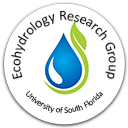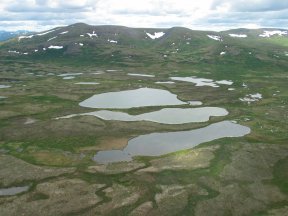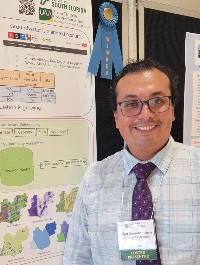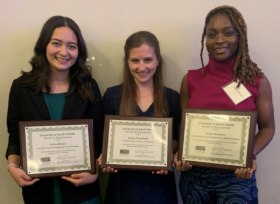News
Michael awarded the Craig B. Hutchinson Memorial Scholarship by the USF Geology Alumni Society
Michael is completing his MS degree in Geology with a focus on modeling groundwater hydrology. His model systems have included both beaver ponds in Alaska and surface waterbodies susceptible to excess nutrient loads in Florida.
ERG tools coming soon to FGIO website
ERG work is increasingly central to Florida’s water-quality protection and restoration strategies, including two decision-support tools jointly funded by federal, state, and local government sponsors: the Landscape Assessment of Nutrient Loading to Waterbodies (LANLoad) – a GIS-based physical model being used to support the prioritization of septic-to-sewer conversions – and the Conservation and Restoration Tool (CReST) – a GIS-based application being used to support the prioritization of land acquisition, conservation, and restoration. Both remain in active development and expansion but are already featured by and will soon be freely available to stakeholders through the Florida Department of Environmental Protection Geographic Information Office Initiatives Portal.
Congratulations Omer and Zamil!
Both have successfully defended their thesis proposals Fall 2025. Omer's thesis proposal "Drier and Warmer? Potential Effects of Climate Change on Groundwater Availability and Temperature, South-Central Alaska" and Zamil's proposal "Automated Mapping of Wetlands and Lakes from Historical Grayscale Aerial Imagery using GeoAI" touch on very different aspects of research being conducted in the ERG. We look forward to their final results and full thesis defenses scheduled for 2026
New funding to enhance water quality
The State of Florida has awarded funding to the ERG to develop a geospatial decision support tool to facilitate identification of sites where physical attributes indicate nutrient loading pose a high risk to waterbodies. This tool can be used, for example, to determine where sites should be prioritized for conversion from septic systems to sewer to enhance water quality. In Phase 1, we identified a process to evaluate and weight physical factors, in Phase 2, in which we fully developed the tool in a pilot location (St Lucie County, FL). In subsequent phases we are extending and refining the tool in select basins through Florida.
Tyelyn selected for NOAA Margaret A Davidson and USF Geology Alumni Richard A Davis fellowships!
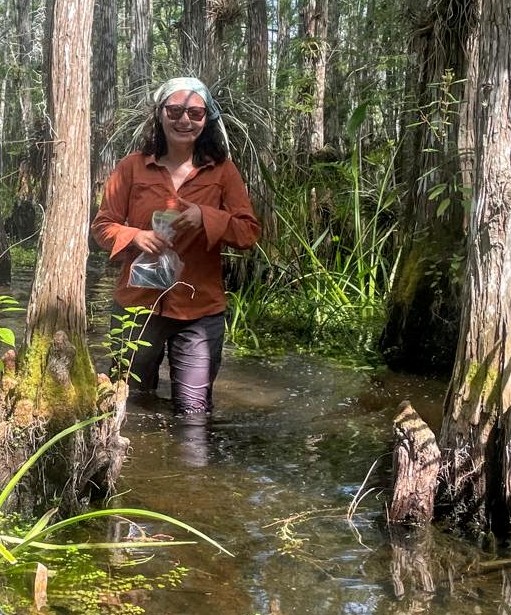
We are so pleased to announce Tyelyn recently has been awarded two fellowships. She was awarded the 2024-2026 NOAA Margaret A. Davidson Fellowship to expand on her research being conducted in the springs, seeps, rivers, and estuaries of Kachemak Bay, Alaska. She looks forward to further collaborations with the community of Homer and KBNERR . We accompany this post with a picture of Tyelyn wading through the Everglades so she remembers Florida is fun, too, and doesn't forget to come back once in awhile. Tyelyn has also been announced as the recipient of the Richard A. Davis Fellowship- awarded by the USF Geology Alumni Society USF Geology Alumni Society in recognition of her progress as a graduate student and her promise as a geologist. Wow!
Tyelyn delivers the keynote presentation
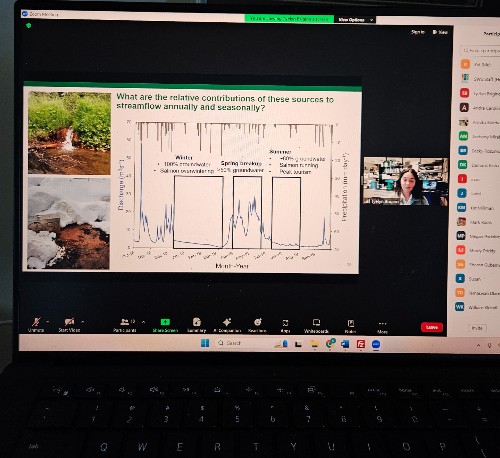
Tyelyn delivered the keynote presentation at the annual Student Virtual conference of the Society of Wetland Scientists. She highlighted the importance of collaborations with community members and other stakeholders to research programs. She delivered this message through describing her research on the significance of groundwater to maintenance of streamflow and ecosystem support in salmon-bearing streams in Alaska while showcasing collaborations she has contributed to and benefitted from. These collaborations have led to increased community awareness of the significance of groundwater and have resulted in meaningful policy change.
ERG Research Makes an Impact on Federal Policy
A recent article by the ERG, Reorganizing the waterscape: asymmetric loss of wetlands and gain of artifical water features in a mixed-use watershed, details the continued loss of wetlands and the simultaneous rapid gain in artificial water features (e.g., AWF, including stormwater ponds, golf course water features, and reservoirs) in the Tampa Bay Watershed, leading to a vast reorganization of the waterscape with unknown effects on ecosystem functions and the goods and services they provide. ERG was encouraged to write the paper during a conversation with Dr. Megan Lang, Chief Scientist with the US Fish & Wildlife Service’s National Wetland Inventory (NWI). NWI has been observing similar trends at a coarser scale nationwide, recently expressed in a report to the US Congress. The Wetland Status and Trends report , which draws upon the ERG article several times, expressly states, “We must commit to raising the bar related to ‘No Net Loss’ to a more explicitly defined standard of ‘No Net Loss’ of vegetated wetlands going forward.” This represents a clear shift away from past policies that tended to treat wetlands and many AWF as equivalent features in status and trends reporting.
Stephanie Lawlor's new position as Conservation Manager
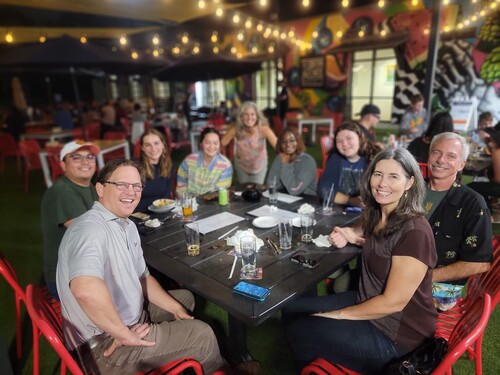
Stephanie earned her MS in Environmental Science and Policy at USF, conducting research on historical mapping and land use change in Florida. She continued with us as a post-grad researcher integrating her insights and GIS expertise into development of a geospatial tool for wetland conservation and restoration in St Lucie County. She has recently accepted a position as Conservation Manager at the Southeast Alaska Land Trust in Juneau, Alaska. We will miss seeing her in lab but look forward to future collaborations and to going out for news and beers when she visits!
St Lucie County Installs Public Education Exhibit Highlighting ERG Research
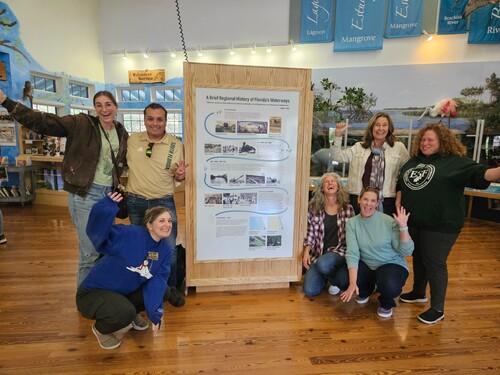
The Oxbow Eco-Center and Preserve in St Lucie County, FL, has a new exhibit to illustrate the profound changes that have occurred in regional land use. Each change is an uncontrolled expeiment with potential consequecnces for down-gradient water quality. The new installation protrays land change since the earliest surveys, circa 1850s. Although it sounds like a long time ago, it was only a few generations ago and Florida was astoundingly different. Our recent publication Forensic wetland and deepwater habitat mapping for setting pre-development conditions details this work. It's fantastic to see it brought to the public in the form of this installation spearheaded by our collaborators, the St Lucie County Environmental Resources Department.
ERG presentations at the University of Florida Water Institute 2024 Symposium
The ERG was in full force at the recent symposium Sustainable Water Resources: Complex Challenges, Integrated Solutions , presenting on the topics listed below.
- Mark: Opening Remarks as Chief Science Officer, Florida Department of Environmental Protection
- Mark: Spatial and Temporal Variability in Hydrological Connectivity in Stream-Wetland Flow Networks
- Kai: Tool for Prioritizing Wetland and Water Project Prioritization in the Indian River Lagoon Watershed
- Edgar: Pilot Scale Septic to Sewer Conversion Prioritization Map Using Analytic Hierarchy Process
- Tyelyn: Groundwater Sustains Salmon Streams: Support to Streamflow and Temperature in South-Central Alaska
- Stephanie: Forensic Wetland and Deepwater Habitat Mapping for Setting Pre-Development Conditions
- Abby: Tampa Bay Groups with Few Financial Resources Lack Benefits from Natural & Artificial Wetlands
The ERG has a new project in Alaska: Utilizing beavers to mitigate climate drying peatland
USF-ERG is collaborating with Kachemak Bay National Estuarine Research Reserve and Alaska Center for Conservation Science, Alaska Wildlife Alliance, and University of Oregon on a multidisciplinary project studying the potential use of beavers as a nature-based solution to counter peatland drying in the Kenai Lowlands, Alaska. USF-ERG’s role in this collaborative project is to conduct hydrologic analyses to test what function a beaver dam may play in lag, sink and source hydrologic functions.
Society of Wetland Scientists and the ERG
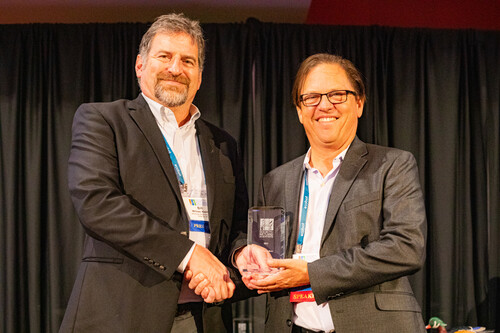
Mark Rains was selected for the 2023 SWS Fellows Award. This is the highest recognition of achievement bestowed by SWS. Mark has been an active memeber of SWS since the 90s and his nomination by his peers and selection by the SWS Fellows Committee was particularly meaningful. Meanwhile, Kai was elected to a three year term on the SWS Executive Board as Secretary-General! They are both proud and honored to be recognized by this society.
Mark's busy year of Plenaries
Mark has been invited to deliver plenary and opening talks to diverse audiences in 2023. It's great to see widespread interest in ERG research and perspectives!
- Replacing Lost Natural Capital and Resilience Through Conservation, Restoration and Engineering Florida Ocean Alliance Coastal Resilience Protecting Florida's Blue Economy and Future Meeting. Nov 2023 Tampa, FL
- Landscape Support for Salmonids: Transforming Science into Outcomes in Alaska Society of Wetland Scientists 2023 Annual Meeting, Spokane, WA
- It’s an Engineering Problem. American Ecological Engineering Society 23rd Annual Meeting. Tampa, FL
Summer 2023 Field Work in Alaska
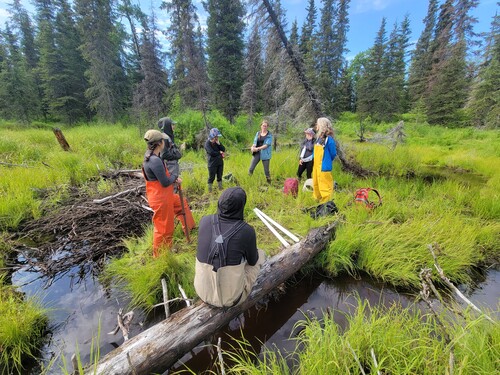
The University of South Florida Ecohydrology Research Group (USF-ERG) had a busy summer working alongside KBNERR and other partners and stakeholders on both existing and newly launched projects. Drs. Mark and Kai Rains and their PhD student Tyelyn Brigino were joined at times by two Ernest F. Hollings Undergraduate Scholars, Eojin Lee (Columbia University) and Maxwell Lyons (UC San Diego). The USF-ERG team continued a long-term study of the role groundwater plays in supporting salmon-bearing streams. This year, they continued focusing on spatial and temporal variability of groundwater, with an added focus on peatlands. They installed monitoring wells, installed continuous water-level and conductivity recorders, and collected water samples. This project has been funded through numerous grants over the years but is currently funded through a grant from the City of Homer with matching funds from the USF-ERG. The USF-ERG team also helped launch a new study on the roles beaver dams and beaver dam analogs might play in hydrologic restoration and the related support of ecosystem functions and services, including carbon sequestration. They helped select field sites and then installed monitoring wells and continuous water-level recorders. This project is funded by a grant from the Wildlife Conservation Alliance and is being conducted in collaboration with the Alaska Wildlife Alliance, the UAA-ACCS, KBNERR, and the University of Oregon.
